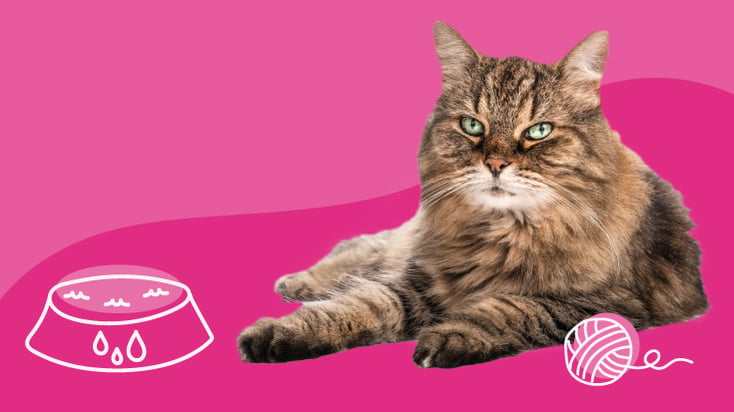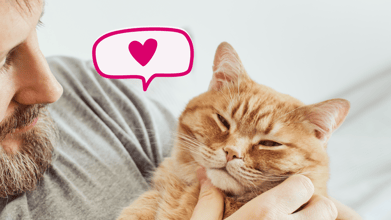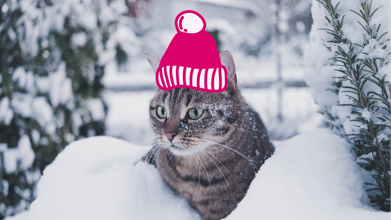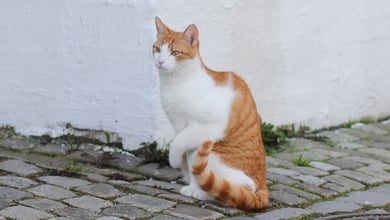Senior Cat Care: 6 Health Tips for Older Cats

Table of Contents
Cats' needs change as they grow older. With modern veterinary practices, quality food, and indoor living, our cats are living healthier, longer lives. So when exactly does the transition from adult to "senior" happen for our feline friends?
Most cats are labeled as "senior" once they reach the age of 10 and beyond. However, with this age milestone, what changes can we expect?

In this blog, we'll scratch the surface of these questions to help pet parents give the best care to their aging companions.
1. Adjust Their Diet
When cats get older, what they eat matters even more. It's important to ensure they don’t get too heavy because extra weight can be hard on them. Not all cat foods are suitable for older cats, so it's a good idea to pick one that's made just for them.
It's always best to consult your veterinarian about the right food choices. They can tell you what's best for your cat's age and health.
Feeding them little meals more often can be better for them, helping them digest food and keep their energy just right.
2. Increase Their Hydration
Water becomes even more critical for older cats. Many senior cats face issues like constipation or kidney disease, and staying hydrated can help manage these problems.
To make sure your cat is drinking enough, try a few tricks. Set up more water spots around the house. Consider using pet fountains – many cats find moving water more appealing.
Also, if your cat is mostly on dry food, it is a good idea to add wet or canned food to their diet. It’s a sneaky way to get them more water; they usually love the taste!
3. Monitor for Signs of Pain
Older cats can be real champs at hiding pain, but there are subtle signs we can look for. Things like moving slower, being less active, or not jumping as much can hint at problems like arthritis.
Keeping a healthy weight is important; it can help reduce the strain on their joints. If you think your senior cat might be hurting, several options can provide pain relief.
To explore treatments like acupuncture, physical therapy, or medications that could benefit your furry friend, schedule a quality of life consultation.
Is Your Cat Showing Signs of Osteoarthritis Pain?
1. Has difficulty jumping up or down.
2. Trouble climbing up stairs - your cat may stop halfway or “bunny hops” with both back legs at the same time.
3. Difficulty getting down the stairs - your cat may angle their body or go down one step at a time.
4. Less interest in playing/chasing - your cat may avoid active play or take frequent breaks.
5. Avoids running - your cat moves at a slower speed and alternates running with walking.
6. Changes in appetite - your cat is showing less interest in food.
7. Changes in grooming - your cat is not grooming as much as usual or is overgrooming certain areas.
8. Personality changes - your cat is less sociable than usual, is hiding more, or is resistant to being touched.
9. Changes in potty habits - your cat is having accidents inside the house or not using the litter box.
View Results
Is Your Cat Showing Signs of Osteoarthritis Pain?
1. Has difficulty jumping up or down.
2. Trouble climbing up stairs - your cat may stop halfway or “bunny hops” with both back legs at the same time.
3. Difficulty getting down the stairs - your cat may angle their body or go down one step at a time.
4. Less interest in playing/chasing - your cat may avoid active play or take frequent breaks.
5. Avoids running - your cat moves at a slower speed and alternates running with walking.
6. Changes in appetite - your cat is showing less interest in food.
7. Changes in grooming - your cat is not grooming as much as usual or is overgrooming certain areas.
8. Personality changes - your cat is less sociable than usual, is hiding more, or is resistant to being touched.
9. Changes in potty habits - your cat is having accidents inside the house or not using the litter box.
Share Quiz
4. Prioritize Feline Dental Health
Don't overlook the importance of healthy teeth and gums, especially in our aging feline friends. They can face problems like gum disease, broken teeth, or oral tumors.
However, it's not just about their mouth; bad dental health can affect their entire body. Dental infections can spread bacteria as well as trigger inflammation in other organs causing harm. That's why staying on top of their dental health is so important.
Regular veterinary dental checkups can catch issues early, and routine care, like brushing, can prevent bigger problems down the road. It's a small step that can make a big difference for our senior cats.
5. Provide Physical and Mental Stimulation
Keeping older cats active and engaged isn't just about preventing boredom—it's essential for their well-being. Environmental enrichment helps their minds stay sharp and bodies agile. It might mean making some changes at home, like adding carpeted ramps for easier climbing, soft landing pads at their favorite jumping spots, or offering orthopedic cat beds for extra comfort.
Think about moving food and water bowls to more accessible spots, especially if your cat isn’t moving around as much as they used to. Adapting to their mobility levels ensures they stay stimulated without straining themselves.
Remember, it’s all about making their golden years golden in every sense!
6. Schedule Regular Vet Visits for Your Feline
Older cats need consistent veterinary checkups. Scheduling biannual visits every 6 months is a practical step to keep senior cats healthy. These appointments catch health issues early, preventing more significant problems later.
Comprehensive exams, including blood work, weight assessments, oral evaluations, and keeping vaccinations up to date, are essential parts of the visit. Staying on top of these visits helps ensure our cats' continued well-being.
Should My Pet Be Seen by a Veterinarian?
1. Have you noticed changes in your pet’s appetite?
2. Does your pet have diarrhea or loose stools?
3. Have you noticed changes in your pet’s thirst/water consumption?
4. Is your pet having accidents in the house?
5. Is your pet pacing and unable to settle?
6. Is your pet panting more than usual?
7. Is your pet whining or vocalizing more than usual?
8. Is your pet shaking more than usual?
9. Is your pet hiding or avoiding physical contact more than usual?
10. Is your pet more lethargic and sleeping more than usual?
11. Are you concerned about changes in your pet’s behavior?
12. Is your pet scratching their ears?
13. Is your pet licking their paws more than usual?
14. Does your pet have a rash?
15. Is your pet moving more slowly than usual or having a harder time getting up or down?
View Results
Should My Pet Be Seen by a Veterinarian?
1. Have you noticed changes in your pet’s appetite?
2. Does your pet have diarrhea or loose stools?
3. Have you noticed changes in your pet’s thirst/water consumption?
4. Is your pet having accidents in the house?
5. Is your pet pacing and unable to settle?
6. Is your pet panting more than usual?
7. Is your pet whining or vocalizing more than usual?
8. Is your pet shaking more than usual?
9. Is your pet hiding or avoiding physical contact more than usual?
10. Is your pet more lethargic and sleeping more than usual?
11. Are you concerned about changes in your pet’s behavior?
12. Is your pet scratching their ears?
13. Is your pet licking their paws more than usual?
14. Does your pet have a rash?
15. Is your pet moving more slowly than usual or having a harder time getting up or down?
Share Quiz
Conclusion
As our cats mature, we must adapt to their changing needs. This involves optimizing their diet, maintaining regular vet visits, and monitoring their overall well-being.
Above all, keeping a predictable routine, setting aside special playtime or nap moments, and consistently showering them with TLC can make a difference in their health and happiness during their senior years.
If you're unsure about ensuring your senior cat's current state, schedule a Veterinary Quality of Life consultation with our experts today. Your cat's well-being is our top priority.
Frequently Asked Questions
What is considered old age for a cat?
Cats typically enter their 'senior' years around the age of 10, with many living well into their late teens or early twenties with proper care.
How often should senior cats see the veterinarian?
Senior cats should see the veterinarian at least every six months for regular checkups and health assessments.
Do older cats sleep more?
Yes, older cats tend to sleep more, often up to 16-20 hours a day, as their energy levels decrease with age.
Should I adjust litter box placement for older cats?
Yes, it's beneficial for older cats to place litter boxes on every floor they access and ensure they're easily reachable to accommodate their reduced mobility.
How do I know if my elderly cat is suffering?
Elderly cats may show signs of suffering through behavior changes, decreased appetite, hiding more often, vocalizing differently, or displaying signs of pain when moving.







